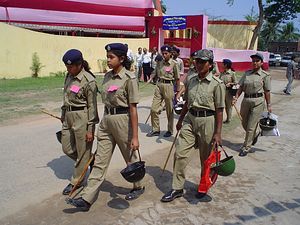In December 2012, the brutal rape and murder of a 21-year-old college student on a bus in New Delhi shook the conscience of the entire nation. The incident led to public outcry, including widespread protests across India decrying crimes against women. The case also gained international attention; the gang rape of the young student led the BBC to produce a documentary called “India’s Daughters.”
The government, shaken by the intensity of protests both in India and abroad, was forced to amend the criminal law by providing for stringent punishments against the perpetrators of sexual offenses. Sadly, the change in law has had little effect on the ground, as sexual offenses against women are on the rise.
According to the National Crimes Records Bureau (NCRB) “assault on women with intent to outrage her modesty” (previously categorized as “molestation”) constitutes the second-most-reported crime against women. In over 337,992 crimes against women reported in 2014, over 82,000 related to this charge.
There are several reasons for the rise in sexual crimes in India. First, the rise in crimes is linked to poor policing. India has one policeman for every 720 persons, which is the lowest police-to-public ratio across the world. The United States, for comparison, has one police officer for every 436 citizens; South Africa has one for 347 citizens and Sri Lanka one for every 424 citizens. According to the Bureau of Police Research & Development (BPR&D), India has a shortage of at least 500,000 police personnel. Of the police India does have, over 33 percent of the police force is deployed for VVIP duties and only around one-third do actual policing.
Second, India’s police are not trained and sensitized to handle sexual crimes. When confronted with such cases, it has been seen that more often than not the police either look the other way or force the victims to settle the issue with the offenders. Moreover, there is a huge shortage of policewomen, which discourages victims from sharing their experience with police officers.
Third, even if cases are taken seriously, the Indian judicial system is painfully slow. It generally takes anywhere from 10 to 15 years for an Indian court to decide on a case and convict the offender. This is primarily because of a shortage of judges. India has 15 judges for every one million, compared to China’s 159. Although, the government has introduced fast track courts to expedite the cases, it still continues to take years before a case sees the light of the day. A Delhi high court judge once estimated it would take 466 years to get through the backlog in the capital alone.
The NCRB has reported that only around 24 percent of those charged with sexual violence are convicted, while the others are let off, largely because of the inability of prosecutors to prove the case. In India, the onus of proving the crime rests with the victims. The victims often avoid narrating the gory details of their ordeal in court because of social stigma; for this reason many crimes do not get registered.
Recently, on New Year’s Eve, inebriated revelers in India’s IT capital, Bangalore, sexually assaulted women who had gathered in public places for celebrations. The police, rather than overpowering the offenders, ended up chasing them away. The incident once again led to public outrage against continued violence against the women. Making matters worse, the state home minister, instead of taking steps to apprehend the perpetrators, laid the blame squarely on the victims for their improper and provocative attire. The police commissioner went one step further by denying the incident ever happened and accusing the media of misreporting. However, when the media released video clips captured on CCTVs, especially a video depicting a woman being groped and molested, the police commissioner swung into action. So far, around five people have been arrested after being identified through the videos.
Similar incidents happened in Delhi. In Delhi, the mob, who outnumbered the police force, reportedly thrashed the officers when they came to the aid of the women. It is reported there were only 4 policemen on duty.
It has been seen that stringent laws have not brought any change on the ground. The government should appoint more police officers, especially women, to prevent and properly respond to attacks against women.
The general public is also equally culpable for not coming to the rescue when women are attacked. In part, this is because of high-profiled incidents when those who tried to help victims were also attacked, even killed. However, these incidents should not deter the community from coming to the aid of victims, instead of looking the other way. They should also inform the police whenever they see such incidents happening. As responsible citizens, it is our paramount duty to assist the police in tackling crimes against women. There is also an urgent need to sensitize primary and secondary students to the evils of such crimes. Further, it is also the responsibility of every parent to teach their children to respect women.
At a time when India is emerging as one of the world’s biggest economies, it must be remembered that true development can be realized only when we are able to ensure the safety and security of our women.
K.S. Venkatachalam is an independent columnist and political commentator.

































